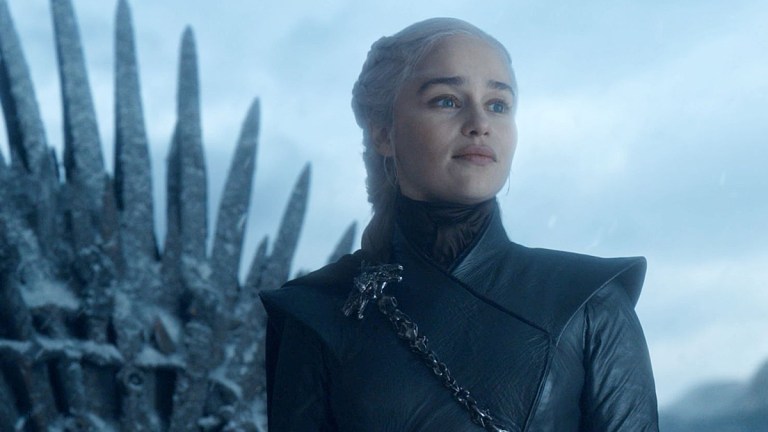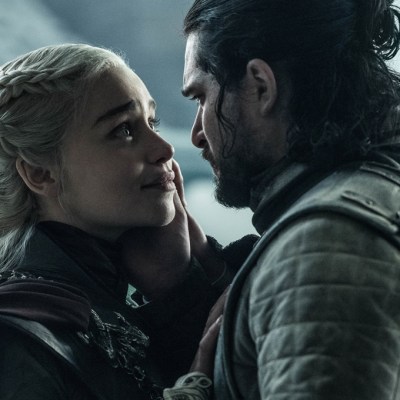Game of Thrones Author Started Worrying After Season 5
George R.R. Martin has finally revealed his feelings about the Game of Thrones series finale, and it’s not good.

While HBO’s Game of Thrones television franchise has fastened its focus toward upcoming prequel series House of the Dragon, the temptation to relitigate controversies of its past remains prevalent. It’s understandable, seeing as one of the most popular television shows in the world purposefully wrapped with a shortened final season that left a significant portion of the audience unsatisfied and exasperated. While author George R.R. Martin remained mum about the way the finale imagined the climax to his still-unfinished source material novels, it seems that his silence is finally starting to break.
Of course, Martin is now defined—at meme levels—by the most prominent case of interminable writer’s block in modern literary history. It’s a phenomenon that resulted in Game of Thrones essentially surpassing the storyline of his A Song of Ice and Fire novels by 2016’s Season 6, requiring showrunners David Benioff and D.B. Weiss to work off a general outline provided by Martin for the final few frames. While Martin has regretfully admitted the unfortunate effect of his extended inability to finish sixth book The Winds of Winter, comments made on his behalf published in James Andrew Miller’s quote-teeming new book, Tinderbox: HBO’s Ruthless Pursuit of New Frontiers (via Winter is Coming and Insider), reveal that he actually shares the concern of fans about the show’s inconsistent storytelling past the events of his books.
“George loves Dan and Dave, but after Season 5 he did start to worry about the path they were [going down] because George knows where the story goes,” said Martin’s representative, Paul Haas. “He started saying, ‘You’re not following my template.’ The first 5 seasons stuck to George’s roadmap. Then they went off George’s roadmap.”
With penultimate novel The Winds of Winter still in the works—and its completion in a perennial state of alleged immediacy—the details of Martin’s roadmap will likely remain a mystery for a very long time, seeing as the author will still need to tackle the seventh and final novel, A Dream of Spring; a prospect that, unfortunately, becomes increasingly inauspicious with each passing year. However, based on Haas’s comment, the climactic events that played out for Game of Thrones’ eighth and final season did not align with said roadmap. This contradicts what was long-assumed about the storytelling tenure of Benioff and Weiss for the show’s final few seasons, and sets the possibility for even more divergences between the show and the canon of Martin’s books. In fact, even the show’s culminating ascension of a certain character to Westeros’ Iron Throne now stands to be contradicted in the novels.
Controversially, the existing 67 episodes worth of Game of Thrones‘ slow-burn story development—most of which adhered to Martin’s novels—would culminate in 2019 with an abbreviated six-episode frame, in which the arcs of major characters arrived at shocking places in a rather inorganic manner. Indeed, few ever imagined Daenerys Targaryen overcoming a series-worth of often-humiliating trials and tribulations, becoming an inspirational, slave-liberating, army-accruing savior in the East, just to—in an almost instant whim—become a genocidal pyromaniac would-be ruler in the West. Likewise, the wheelchair-bound Bran Stark’s telegraphed destiny to become the supernaturally-omniscient, petty-power-eschewing Three-Eyed Raven seemed to belie what would be his ultimate fate as Westeros’s ruler and winner of the show’s eponymous contest. Yet, those were indeed just a few of the widely-vexing outcomes showcased on the finale.
While there’s obviously nothing wrong with outcomes that ultimately surprise audiences, the predominant gripe with Game of Thrones is that the outcomes represented sharp turns abruptly executed in the name of expediency, apparently due to the fatigue of the showrunners. “Dan and Dave were tired, rightfully so,” explained Haas. “They were done, and wanted to move on, so they cut it short and then negotiations became, how many seasons can we stretch this out? Because of course HBO wanted more.” Indeed, the dwindling output of the final two seasons was a source of disappointment for fans, as the show’s tradition of ten-episode frames was broken with 2017’s Season 7, which arrived with just seven. Yet, the announcement that the series-concluding Season 8 would further cut back with only six episodes planned—a bit of belt-tightening that, even ahead of production, stood out as a red flag to fans regarding the show’s increasingly-diluted, off-course adaptation strategy for Martin’s grandiose mythology.
Pertinently, comments from Martin himself published in Tinderbox reveal that he believes Benioff and Weiss’s early tap-out adversely affected the quality of the show in its last seasons. “I wish it had run for ten years,” he laments. “I think that would’ve given us a little more time in the later seasons to end it. But that might be just because I’m still trying to end it in these books here.” The showrunners’ move to cut the show short was not only detrimental to the storytelling strategy, but also affected their own worth to fans and those in the industry. Indeed, an opportunity bestowed onto the duo—during the height of the show’s popularity—by Disney to create a new Star Wars Trilogy subsequently slipped through their fingers, and their purportedly $200 million Netflix deal has yet to yield genre fruit prominent enough to justify such a price tag.
Consequently, House of the Dragon is operating under the purview of a new showrunner pair in celebrated Game of Thrones director Miguel Sapochnik and franchise newcomer Ryan Condal, who comes off USA Network sci-fi dystopia series Colony. The series—following the Targaryens in Westeros some 200 years earlier—will see the franchise return to ten-episode-per-season glory, debuting in 2022 on a date to be revealed. And as for Martin, his book comments also provide an update on his current endeavors—familiar-sounding as it may be to fans. “I’m working on The Winds of Winter even now as I have been for the best part of a decade. And hopefully I’m going to get to that end soon and then people can argue about which ending they like better.”

